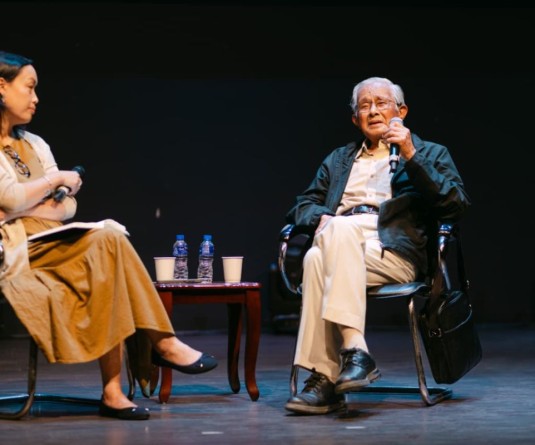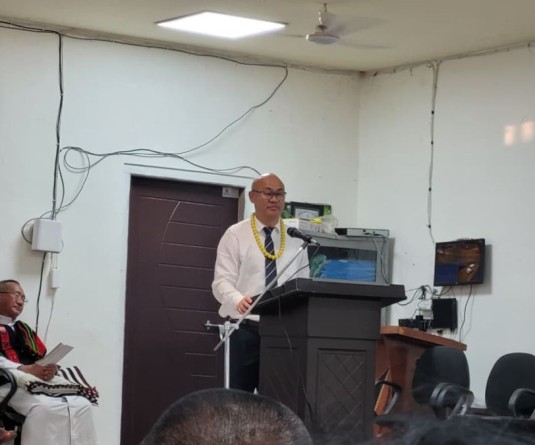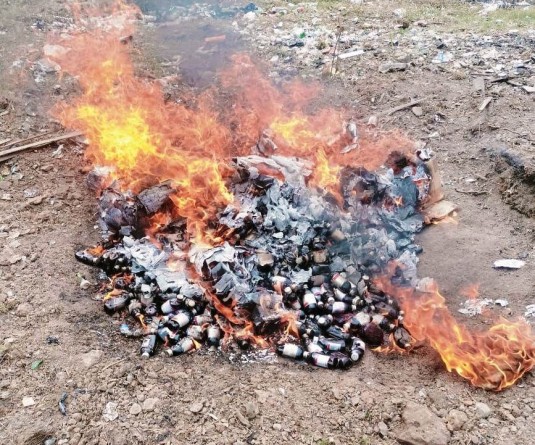Mezivolu T Therieh (NJS), District & Sessions Judge, Phek speaking during the event on July 17.

Morung Express News
Kohima | July 17
Mezivolu T Therieh (NJS), District & Sessions Judge, Phek and former Registrar of the Supreme Court of India, on Friday stated that while the media has a big role in protecting the identity of a child—whether it is accused, victim or witness—she underscored that children are the most vulnerable sections of society.
She was speaking as the resource person at the one-day workshop on “Understanding Child Rights & Child Protection: Role of the Media” organized by the Kohima Press Club (KPC) in collaboration with the Nagaland State Commission for Protection of Child Rights at Hotel Japfü on July 19.
Dwelling on the privacy, rights and emotions of a child, she spoke about the media as a stakeholder in protecting child rights, and whether the media’s focus is towards actual child rights or exploitation, or if its focus is more on sensational news.
She also deliberated on international law and guidelines, including the UN Convention on the Rights of the Child (UNCRC)–UNICEF, and domestic law, while touching upon the Juvenile Justice (Care and Protection of Children) Act, 2015 – Section 74; the Press Council of India Act, 1978; Bharatiya Nyaya Sanhita – Section 72, 2023 (Indian Penal Code) – Section 228A; the Cable Television Networks (Regulations) Act, 1995 – Section 16 and Rules, 1994 Rules 6 & 7; and the Protection of Children from Sexual Offences Act, 2012 – Section 23.
In this regard, she cited the Arushi & Hemraj double murder case of 2008, which resulted in “trial by media before trial by court, leaking private information – violation of JJ Act & POCSO, character assassination: child, parents, victim made/shown as accused, public perception & justice based solely on media coverage and violations of ethical & legal norms.”
Best practices for journalists/media
Reiterating the need to protect the identity of children who are below or up to 18 years of age, she further shared some best practices for journalists and media while reporting: “Always blur faces/use pseudonyms and avoid identifiers; Obtain written consent if necessary and ensure it’s in the child’s best interest; Use child friendly language and dignity-focused framing in stories; Focus on dignity and solutions not sensationalism – practice ethical reporting; Collaborate with legal and child rights experts when covering sensitive cases,” she highlighted.
While covering child-centered news, she urged that the focus of the media should not be consumer choice but on the interest of the child. She also called for providing child-oriented news content and engaging children and the youth population to read newspapers, which would ensure the right to information of a child to get proper information suitable to them.
She further deliberated on the legal rules that every journalist must follow when covering children. These include: “Not to publish child’s name or photo in sexual offence cases – penalty up to 6 months imprisonment and fine; Not to reveal identity of a CICWL – JJ Act – penalty up to 6 months imprisonment and fine; Not to share or circulate child sexual abuse content even if it is for awareness – S 67B IT Act – penalty up to 7 years with fine; Do obtain written consent from guardians when interviewing or filming children; Do ensure the child is not portrayed in a demeaning, exploitative or dangerous way.”
Stating that it is important to give the correct news, she also asserted that one needs to be very cautious while dealing with the involvement of children in news. “Keep the child right in front of you so the child is not affected,” she advised.
Earlier, President of Kohima Press Club, Alice Yhoshü, highlighted that the main child protection legislations in India are the Juvenile Justice (Care and Protection of Children) Act, 2015; the Protection of Children from Sexual Offences (POCSO) Act, 2012; and the Child Labour (Prohibition and Regulation) Act, 1986.
As journalists and reporters, she said that, “we cover numerous and wide range of topics and backgrounds that sometimes make us seem or even feel that we know everything. But the truth is, we don’t,” while citing whether we are aware of which provisions under the Juvenile Justice Act or the POCSO Act protect the identity of a victim of a violent and traumatic experience.
Citing the witness of unfortunate instances where the media has been overly intrusive and reported child-related stories irresponsibly, unaware of the further damage that their reporting is causing to the child and his/her family members, she stated that, “it is in this backdrop that the Kohima Press Club has come up with the proposal to have an in-depth workshop on understanding children’s rights and protection, so as to build the capacity of journalists and equip our members with the knowledge and skills to report responsibly on child-related issues.”
She further asserted that journalists should know at least the basic of the existing child protection laws and uphold the best interests of the child or children when directly or indirectly reporting on minors. Reiterating that, “we need to be sensitive when approaching any issues related to childhood in general,” she underscored that, “while the media must uphold journalistic freedom that must be preserved and promoted, it should also maintain ethical and professional responsibility when it comes to reporting children-related issues and safeguard their best interests.”
“We must prioritize child protection, even if it means to compromise the local perception of competition for headlines, winning the audience or increasing the number of readership, viewership or followers, as one may call it, in this day and age of the social media,” she added.






